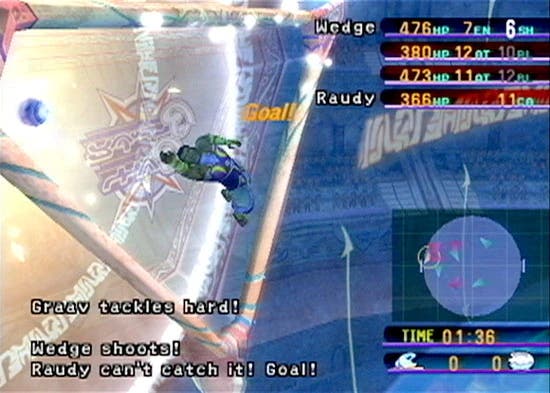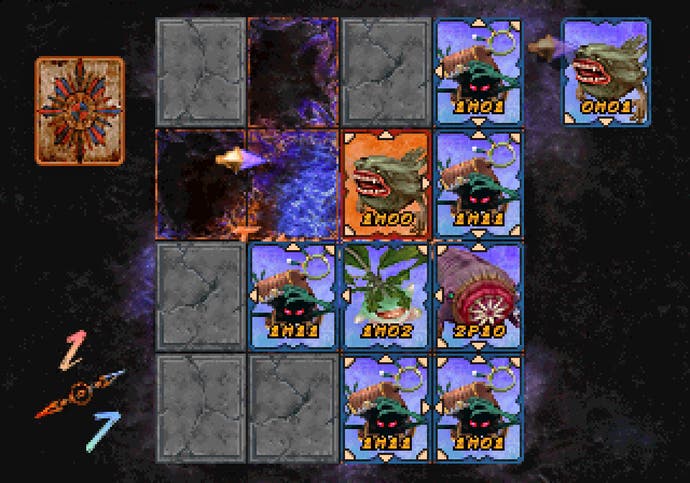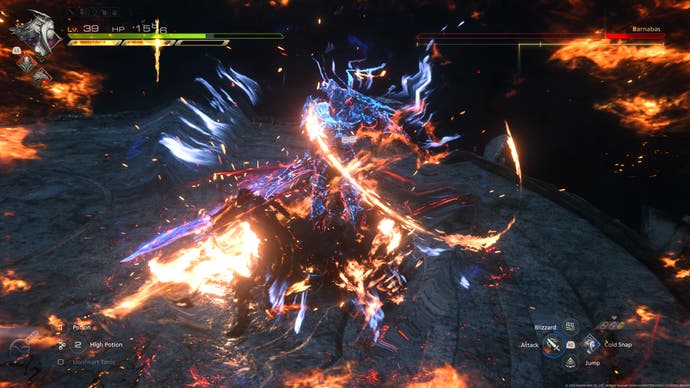Dear Square Enix: please bring back Final Fantasy's mini-games
Eikon only imagine.
Ask me to pick two moments that sum up Final Fantasy X and I'd probably roll with 1) Yuna dancing on the ocean at Kilika to send the souls of the dead to the Farplane, and 2) Tidus performing a Sphere Shot in Blitzball. The first because it's a mesmerising performance of grief and transcendence, the second because it's patently daft in the best of ways. Blitzball, in case you haven't had the pleasure, is FFX's central minigame. It's essentially rugby but played in a stadium-sized water bubble, with stats and status effects cheerfully lifted from the turn-based combat system. Sphere Shot is Tidus's signature move as a young Blitzball star - it sees him backward-somersaulting in slow motion to perform a kick on goal with a randomised buff.
I once tried to perform a Sphere Shot in my local pool's deep end, and can attest that this is not how aquatic physics works - at the very least, it should involve more nosebleeds. But it looks dang swish in action, and while Blitzball has its flaws as a virtual sport - why can't I swim up and down? Why don't the players drown? Why is poisoning the ball not an automatic red card? - it's an immensely fun addition to one of the great PS2 RPGs, not least for how it slops over into regular exploration. You'll scout new Blitzball players from all across Spira, and flushing out the local talent gives each settlement in the game that extra element of intrigue.
Final Fantasy has a proud tradition of mini-games of all shapes and sizes, from the hidden number puzzle in the very first game through fishing in FF12 to pinball in FF15. I could have done with some of that while playing Final Fantasy 16. As you may have read in my Final Fantasy 16 review, I found the game to be full of good things with lots of less-good things between them. The story quests can be thrilling but many of the sidequests feel like office admin. The combat sings, but half the fights are with reluctant scorpions and rando bandits who seem to barely understand the mechanics of swinging a sword. A proper side activity of some kind would have been a pleasant relief. Sadly, the nearest FF16 offers to this are those feats of spectacular genre-splicing you encounter during larger Eikon bossfights.

According to the game's director Hiroshi Takai, excluding mini-games was a deliberate choice to "immerse" you in protagonist Clive Rosfield, who is driven by grief and vengeance and as such, has no headspace for such frivolous distractions. Given that you can send Clive on sidequests to pick flowers and deliver packed lunches, I'm not sure this reasoning holds water - admittedly, the game does lock off these diversions when Clive is in a state of maximum pique. It also doesn't really speak to how Clive thaws as the story goes on, acquiring a surrogate family and learning - like many a grimdark hero before - that he needs to live for something other than revenge.
I can't see grumpy old Clive getting into Blitzball, though I would love to watch him try - he has a habit of bursting into flame, so at best, the playing field would evaporate. But I can definitely imagine him developing a taste for a cardgame such as Final Fantasy 9's Tetra Master, while wandering Valisthea's many taverns. Latterly upgraded into a standalone mobile game, Tetra Master sees you placing numbered monster cards on a grid to flip those of your opponent. It's so compulsive it almost stopped me playing Final Fantasy 9 itself. I must have spent five hours roaming the streets of Alexandria during the prologue, tracking down every last Tetra enthusiast and robbing them of their best cards - or rather, slowly earning back the ones they'd won from my hand.
Or how about an FF16 version of FF9's theatre battles, where you'd match prompts to swing and dodge correctly and score points with the audience? The seeds of that crossover are already there in FF16’s Eikon bossfights, with their earth-shattering QTEs. I can't remember there being an actual theatre in FF16, but given how much time Clive spends boosting morale at the Hideaway, a community pantomime or similar doesn't seem out of the question. The roles practically cast themselves: Gav can be a cool pirate, Mid can be the comedy urchin who throws sweets to the children, and Jill - well, Jill can play a tree of some kind.
The value of Final Fantasy mini-games isn't necessarily that they're entertaining. It's how they give the setting substance and texture. The original Final Fantasy 7 above all is jam-packed with optional activities that are, in many cases, powerfully naff. But even the least gripping FF mini-games enrich the world, offering it up to you as a place where anything can happen, a bubbling society defined not just by bloodshed and mechanisms that support the bloodshed, but a range of vocations and pastimes - even other types of game.

In the case of chunkier, pervasive side activities like Blitzball and Tetra Master, they also offer more ways of bonding with characters, who aren't simply people to buy things from or deliver quest items to, but fellow nerds, potential recruits and even rivals. FF16's world is lovingly wrought, with a wealth of detail at the level of both the art and the writing, but in the absence of spare "gameplay verbs" (a term lots of developers seem to hate - sorry!) it feels a little lifeless.
While I have no reason to doubt Takai's sincerity with regard to the point about Clive's characterisation, I do wonder whether that lack of mini-games was also a question of budget. Games today are vastly more expensive and fiddly to create than they were back on PS1 and PS2, which means that publishers may have less patience for bespoke flavour content - everything needs to plug into the core loop. Nothing should be inessential. Still, Square Enix set aside some budget for dance-offs and gym workouts in 2020's Final Fantasy 7 Remake. Perhaps they can rustle up a dartboard for Final Fantasy 17?


